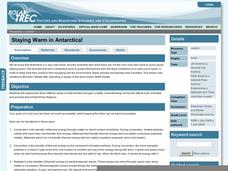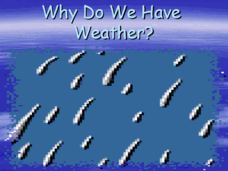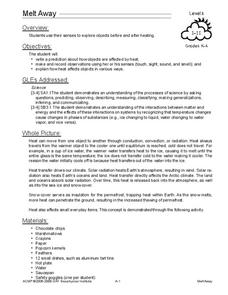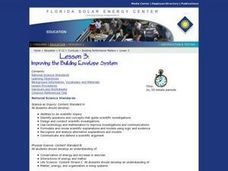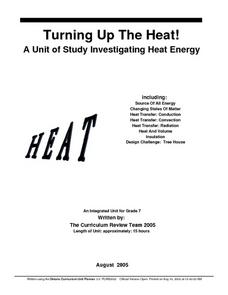Curated OER
Fusion Confusion
Students are introduced to three types of energy transfer: conduction, convection, and radiation. They model the scientific process of fusion to become with the sun and how it produces energy.
Curated OER
IPC Textbook Guided Reading-Chapter 27-Heat
In this heat instructional activity, students answer 21 short answer questions about heat transfer through conduction and convection, thermal conduction and conductors.
Polar Trec
Staying Warm in Antarctica!
Has your class ever wondered how animals and scientists stay warm in the Polar Regions? Kids will investigate to understand the three types of heat transfer and how heat transfer affects those trying to stay toasty in sub-zero...
Curated OER
Why Do We Have Weather?
Convection is offered as the reason behind our weather phenomena. This presentation assumes that viewers are familiar with the methods of heat transfer, and is therefore more geared toward middle-school meteorologists. The focus is on...
Teach Engineering
Insulation Materials Investigation
Don't melt away! Pairs investigate different insulation materials to determine which one is better than the others. Using a low-temp heat plate, the teams insulate an ice cube from the heat source with a variety of substances. They...
Urbana School District
Thermodynamics
Entropy, it isn't what it used to be. Presentation includes kinetic-molecular theory, heat and internal energy, thermal equilibrium, temperature scales, laws of thermodynamics, entropy, latent heat of fusion, specific heat, calorimetry,...
Curated OER
How is heat transferred through conduction?
Fifth graders observe different types of conductors. They answer orally about the conduction of heat energy with 100% accuracy. Students investigate some materials that conduct heat much better than others, and poor conductors can...
Curated OER
Atmospheric Processes - Radiation
Students investigate how different surfaces absorb heat, and how the physical characteristics of a surface have a powerful effect on the way a surface absorbs and releases heat from the sun.
Curated OER
Melt Away
Students explore objects before and after heating using their senses. In this matter and energy lesson, students experiment with a variety of objects and use their senses (except taste) to make predictions and record observations...
Curated OER
Heat Transfer In The Atmosphere
In this science worksheet, students find the meaning of radiation, conduction, and convection and how they operate in the global atmosphere.
Curated OER
It's Gettin' Hot In Here, So Transfer Energy
Young scholars study the means by which energy is transferred from the sun through the Earth's atmosphere. They examine radiation, conduction, and convection. They complete a lab to determine how the different transfers affect the...
Science Matters
Thermal Energy Flow in Materials
The sun sends the earth 35,000 times the amount of energy required by all of us on the entire planet, every day. The fourth lesson in the 10-part series looks at how light energy from the sun transfers into thermal energy. Scholars build...
Curated OER
Energy from the Sun
In this energy worksheet, students complete a chart on the three types of heat transfer and their causes. Then they explain why all of the radiation directed at Earth does not reach the surface. Students also explain the factors in the...
Curated OER
Melts in Your Bag, Not in Your Hands
Students study how the sun transfers heat to the earth through radiation. They examine how animals absorb energy from the sun to warm their bodies by experiment with chocolate melting. They examine sun safety.
Curated OER
Energy from the Sun
In this energy from the sun instructional activity, students are given 20 terms to complete sentences about the sun, the energy of the sun, the radiation of the sun, the transfer of energy from the sun and the currents created by the...
Curated OER
Heat Discrepancies
Students answer the question, "Why do Eskimos build houses out of ice to keep warm. Since heat goes from hot to cold, don¿¿¿t the ice walls take away the warmth inside the house?" They explain how snow or ice can actually be insulators.
Curated OER
Solar Box Cooker
Learners explore solar power. In this solar power lesson plan, students build simple solar cookers after they study convection, conduction, and radiation. Learners transfer their knowledge of how the solar cooker works to climate changes...
Curated OER
Improving the Building Envelope System
Students explain the different heat transfer mechanisms and how they influence the building envelope. They develop ways in which the building envelope can be improved and test hypotheses about building envelope designs.
Curated OER
Heat Transfer
Eighth graders form teams. Students place a thermometer in ball of clay and place in an insulated cup filled with hot water and then another thermometer in a ball of clay in an insulated cup of cold water. Students record temperature...
Polar Trec
South Pole Ice Cream!
How can you turn an ice cream activity into a scientific investigation? It's easy if you know ionic compounds, heat transfer, and the exothermic and endothermic process. Learners will explore the science behind freezing, insulation, and...
Curated OER
Turning Up The Heat!
Pupils investigate the properties of heat. They explore methods of temperature control and measurement. Through experimentation and activities, students design a high tech tree house. They consider electrical, solar, and natural heat and...
Curated OER
Heat Flow
Middle schoolers explore how a whale's countercurrent flow of blood is an example of a heat exchange system and conduction. Excellent worksheet provided.
Rhythm Rhyme Results
Whatʼs the Same and Whatʼs Different?
Learn about radiation, convection, and conduction with a multiple choice worksheet. Each question prompts kids to decide what is different about each form of heat energy transfer, and what is the same.
Curated OER
Convection Currents
Learners explain and understand the circulation of air in the atmosphere. They identify that energy can be carried from one place to another by heat flow or by waves, including water, light and sound waves, or by moving objects. ...


